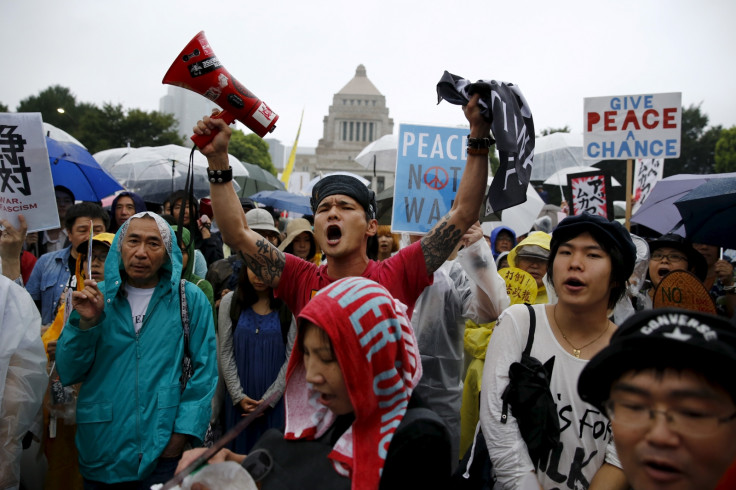Huge Tokyo protest against PM Shinzo Abe's plans to expand Japan's military powers

Thousands of protesters gathered in Tokyo on Saturday to oppose plans by Japanese Prime Minister Shinzo Abe to allow the Japanese military to deploy troops overseas. The proposed legislation is in response to the escalating territorial dispute with China.
In one of Japan's largest demonstrations in recent history — organisers put the crowd at 120,000 people – protesters of all ages waved placards and chanted slogans such as "No War" and "Abe, quit". Demonstrators swarmed into the street before parliament's main gate after the crowd had grown to such a level that it was unmanageable for police to handle.
The rally was one of more than 300 this weekend in Japan protesting Abe's move to loosen the post-war, pacifist constitution's constraints on the military. The constitution, which was imposed by the US following the Second World War, limits Japan's military to a strictly self-defensive mandate, according to The Japan Times.
While the restrictions were introduced by an occupying force, many Japanese have become strongly attached to their country's pacifism over the decades, and they fear any change to that status will lead them become embroiled in distant America-led wars. Among those that believe Abe's military expansionist legislation could lead to past errors happening again is 44-year-old associate professor Naoko Hiramatsu.
Speaking at the Tokyo protests to The Japan Times, he said: "If I don't take action and try to put a stop on this, I will not be able to explain myself to my child in the future."
In July 2015, Abe pushed through a group of bills in the parliament's lower house that permitted Japan's armed forces to defend an ally under attack, a drastic policy shift in the country's post-war security policy. The bills are currently before the upper chamber of Japan's parliament, which is also controlled by Abe's ruling bloc and aims to pass the legislation before parliament's session ends on Sept. 27.
However, Abe's approval ratings have been hit because of the strong opposition to the security bills. According to polls, over half of the population in the country opposes more militaristic bills. "We need to make the Abe government realise the public is having a sense of crisis and angry," Katsuya Okada, head of Japan's largest opposition party, the Democratic Party of Japan, told the Tokyo rally. "Let's work together to have the bills scrapped."
The protest was the biggest in Tokyo since the mass demonstrations against nuclear power in the summer of 2012, after the March 2011 Fukushima atomic disaster, according to Bloomberg. The demonstrations, however, failed to stop the reactor from being restarted in August 2015.
© Copyright IBTimes 2025. All rights reserved.




















